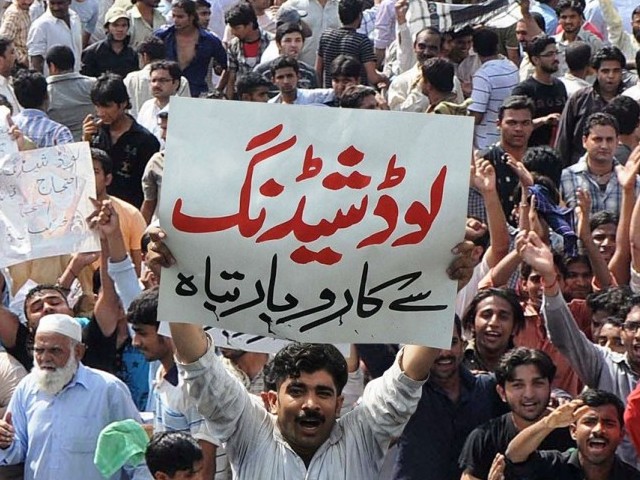
Protesters took to the streets against load-shedding in different cities, including Multan, Khanewal, Vehari, Lodhran, Layyah, Dera Ghazi Khan and Muzaffargarh.
Temperature in Multan soared to 47 degrees centigrade, highest in the month of April. As the shortfall of electricity reached over 5,000 megawatts, citizens staged protests against prolonged power cuts. The protesters, carrying banners and placards, shouted slogans against the government and Water and Power Development Authority (WAPDA) officials demanding uninterrupted power supply.
In Multan, citizens, traders and students staged protest demonstrations against load-shedding at Chowk Kumharanwala, Nine Square, Shahrukn-e-Alam and Khanewal Road.
Usama, a student of first year, told The Express Tribune that many of his class fellows in the college fell unconscious due to hot temperature and load-shedding. “We cannot even study peacefully due to power outages,” he said.
Meanwhile, the business community urged the government to generate maximum electricity through solar energy as Pakistan is blessed with enormous solar potential and could generate three million megawatts of electricity from the process.
Multan Chamber of Commerce & Industry (MCCI) President Khawaja Jalaluddin Roomi said, “Focus on solar power is essential for energy security which will not only fulfill all our needs but that of other nations.”
Another businessman Mubashir Hassan said the govt spent about $12 billion on the import of crude oil of which 70% oil is used to generate power that costs Rs18 per unit. “Shifting to solar energy can help reduce electricity cost to Rs6 to Rs8 per unit which can help millions of people in Pakistan,” he added.
He maintained the cost of solar power would come down substantially; therefore it should be focused. He pointed out the global use of solar power had jumped from five GW to 227 GW during 2005-2010 while the cost of power generation had reduced from $76 per KV in 1977 to three cents Moreover, it would be pollution free and there would be no need to import coal from different countries, he said.
In Dera Ghazi Khan, parents demanded the government to announce summer vacations due to surge in temperature and prolonged power outages.
While speaking to The Express Tribune, a resident of Dera Ghazi Khan Mudassir Ali said, “The government should announce summer vacations in schools as it has failed to provide uninterrupted supply of electricity.” He asked, “How can our children study in such hot temperature without electricity?”
Mazhar Ali, a tailor, said due to excessive load-shedding his business was suffering huge losses. “My workers wait for hours every day for the electricity to come and there is no fixed schedule,” he added. “MEPCO officials do not even attend calls let alone informing about the schedule,” he lamented. Similarly, scores of residents in Khanewal and adjacent villages staged a demonstration against the government over prolonged and unscheduled load-shedding in their areas.
Amin Adil, one of the protesters, said, “Life has come to a standstill. It is hot, we have run out of water. There seems to be no relief.”
Nasir Jamshed, another protester, said, “We pay our electricity bills regularly. Why are we suffering day-long load shedding? We complained about the power outage in our neighbourhood several times MEPCO officials were not concerned about it.”
MEPCO spokesperson Jamshed Niazi said the power utility was carrying out four to five hours of load-shedding in urban areas while six hours in rural areas.
Published in The Express Tribune, April 19th, 2017.

















COMMENTS
Comments are moderated and generally will be posted if they are on-topic and not abusive.
For more information, please see our Comments FAQ